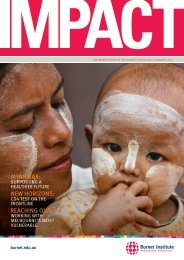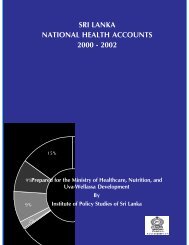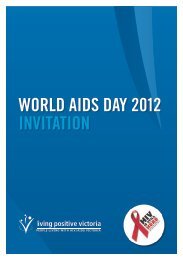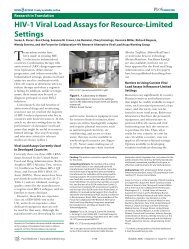Illicit Drug use in the Asia Pacific Region - Burnet Institute
Illicit Drug use in the Asia Pacific Region - Burnet Institute
Illicit Drug use in the Asia Pacific Region - Burnet Institute
You also want an ePaper? Increase the reach of your titles
YUMPU automatically turns print PDFs into web optimized ePapers that Google loves.
Situational analysis of illicit drug issues and responses <strong>in</strong> <strong>the</strong> <strong>Asia</strong>–<strong>Pacific</strong> region<br />
322<br />
B2 . Australia’s<br />
regional efforts<br />
Customs<br />
World Customs Organisation (WCO)<br />
Australian Customs contributes to World Customs<br />
Organisation (WCO) <strong>in</strong>itiatives to counter<br />
<strong>the</strong> illegal traffic <strong>in</strong> narcotics . Information is<br />
shared with <strong>the</strong> <strong>Region</strong>al Intelligence Liaison<br />
Office for <strong>Asia</strong> and <strong>the</strong> <strong>Pacific</strong>, currently based<br />
<strong>in</strong> Beij<strong>in</strong>g .<br />
Oceania Customs Organisation (OCO)<br />
Australia is an active Member of <strong>the</strong> OCO and<br />
works very closely with <strong>the</strong> OCO Secretariat .<br />
Australia is a member of <strong>the</strong> current advisory<br />
committee and is contribut<strong>in</strong>g to <strong>the</strong> development<br />
of <strong>the</strong> <strong>Region</strong>al Trade Facilitation<br />
Program, funded by AusAID and NZAID .<br />
As a member of <strong>the</strong> OCO, Australia delivers<br />
capacity-build<strong>in</strong>g assistance to fellow<br />
members as necessary and able .<br />
Bilateral agreements<br />
Australian Customs has taken a strong role <strong>in</strong><br />
promot<strong>in</strong>g cooperation among law enforcement<br />
agencies <strong>in</strong> <strong>the</strong> <strong>Pacific</strong> region . This<br />
cooperation encompasses <strong>the</strong> range of<br />
Customs activities <strong>in</strong>clud<strong>in</strong>g those relat<strong>in</strong>g<br />
to narcotics . In many cases this cooperation<br />
is encompassed <strong>in</strong> a bilateral agreement or a<br />
memorandum of understand<strong>in</strong>g . Australian<br />
Customs has longstand<strong>in</strong>g agreements <strong>in</strong><br />
place with its counterpart agency <strong>in</strong> Hong<br />
Kong, New Zealand, Korea and Papua New<br />
Gu<strong>in</strong>ea . More recently agreements have been<br />
signed with: Indonesia (March 2003), Japan<br />
(June 2003), Fiji (October 2003), Thailand<br />
(December 2003) and Ch<strong>in</strong>a (April 2004) .<br />
Overseas posts<br />
Customs has senior Australian representatives<br />
<strong>in</strong> six locations — Bangkok, Beij<strong>in</strong>g, Brussels,<br />
Jakarta, Tokyo and Wash<strong>in</strong>gton . Their duties<br />
<strong>in</strong>clude represent<strong>in</strong>g Customs at a wide range<br />
of narcotic-related meet<strong>in</strong>gs, sem<strong>in</strong>ars, conferences<br />
and work<strong>in</strong>g groups .<br />
Project PRISM (Precursors Required<br />
for <strong>Illicit</strong> Syn<strong>the</strong>tic Manufacture)<br />
In recognition of <strong>the</strong> <strong>in</strong>ternational nature<br />
of <strong>the</strong> diversion of precursor chemicals for<br />
illicit drug manufacture, Australia is participat<strong>in</strong>g<br />
<strong>in</strong> <strong>the</strong> International Narcotics Control<br />
Board’s Project PRISM . Customs was recently<br />
appo<strong>in</strong>ted as <strong>the</strong> Central National Authority<br />
(CNA) for Australia’s <strong>in</strong>volvement <strong>in</strong> Project<br />
PRISM . The aim of Project PRISM is to prevent<br />
<strong>the</strong> diversion of amphetam<strong>in</strong>e-type substance<br />
(ATS) precursors <strong>in</strong>to illicit drug manufacture<br />
. As <strong>the</strong> CNA, Customs acts as <strong>the</strong> s<strong>in</strong>gle<br />
contact po<strong>in</strong>t for domestic and <strong>in</strong>ternational<br />
agencies <strong>in</strong> relation to Project PRISM requests<br />
and activities <strong>in</strong> Australia . Customs has also<br />
recently jo<strong>in</strong>ed <strong>the</strong> Project PRISM Task Force,<br />
<strong>the</strong> central govern<strong>in</strong>g body of Project PRISM,<br />
as <strong>the</strong> regional focal po<strong>in</strong>t for Oceania .<br />
CAPERS<br />
Customs also works to foster <strong>in</strong>ternational<br />
<strong>in</strong>itiatives with narcotic-related applications .<br />
For example, Customs co-sponsors <strong>the</strong><br />
Customs <strong>Asia</strong> <strong>Pacific</strong> Enforcement Report<strong>in</strong>g<br />
System (CAPERS), an <strong>in</strong>ternet-based secure<br />
communication platform .<br />
Jo<strong>in</strong>t cross-border patrols<br />
Australian Customs vessels have cont<strong>in</strong>ued<br />
to support jo<strong>in</strong>t cross-border patrols by<br />
law enforcement officials from Australia<br />
and Papua New Gu<strong>in</strong>ea . The extended<br />
patrols visit remote coastal villages and<br />
island communities <strong>in</strong> <strong>the</strong> Torres Strait<br />
and <strong>the</strong> Western Prov<strong>in</strong>ce region of Papua<br />
New Gu<strong>in</strong>ea .<br />
AusAID<br />
Leadership role<br />
Australia has taken a leadership role <strong>in</strong> <strong>the</strong><br />
<strong>Asia</strong>–<strong>Pacific</strong> region on HIV/AIDS, which<br />
has been recognised by <strong>the</strong> Development<br />
Assistance Committee and Executive Directors<br />
of <strong>the</strong> Global Fund and UNAIDS .<br />
Australia’s programs <strong>in</strong> <strong>the</strong> <strong>Asia</strong>–<strong>Pacific</strong> region<br />
draw on Australian expertise to work <strong>in</strong><br />
countries with <strong>in</strong>creas<strong>in</strong>g HIV prevalence rates<br />
such as Papua New Gu<strong>in</strong>ea ($60 million over<br />
five years) and Indonesia ($35 million over<br />
five years) . While recognis<strong>in</strong>g <strong>the</strong> significant<br />
need to combat HIV/AIDS <strong>in</strong> Africa and o<strong>the</strong>r<br />
regions, Australia is a key donor <strong>in</strong> <strong>the</strong> <strong>Asia</strong>–<br />
<strong>Pacific</strong> region and gives priority to help<strong>in</strong>g<br />
our closest neighbours .<br />
The l<strong>in</strong>k between IDUs and HIV/AIDS<br />
and AusAID’s HIV/AIDS strategy<br />
The efficiency with which <strong>in</strong>ject<strong>in</strong>g drug <strong>use</strong><br />
can transmit HIV means that it has emerged<br />
as a pr<strong>in</strong>cipal driv<strong>in</strong>g force for <strong>the</strong> epidemic<br />
across much of <strong>Asia</strong> . At least 50 per cent<br />
of IDUs <strong>in</strong> Thailand, Burma (Myanmar),<br />
Vietnam and Malaysia were estimated to be<br />
HIV positive <strong>in</strong> 2001 .<br />
In response to <strong>the</strong> strong l<strong>in</strong>k between <strong>in</strong>ject<strong>in</strong>g<br />
drug <strong>use</strong> and HIV transmission throughout<br />
much of <strong>Asia</strong>, a greater focus on tackl<strong>in</strong>g issues<br />
around <strong>the</strong> harm associated with <strong>in</strong>ject<strong>in</strong>g<br />
drug <strong>use</strong> will be required . Without a focus on<br />
HIV transmission between and from IDUs, <strong>the</strong><br />
effectiveness of HIV/AIDS <strong>in</strong>terventions with<strong>in</strong><br />
<strong>Asia</strong> will be limited and epidemics will cont<strong>in</strong>ue<br />
to spread <strong>in</strong>to <strong>the</strong> general population .<br />
AusAID launched Australia’s ‘International<br />
HIV/AIDS Strategy: Meet<strong>in</strong>g <strong>the</strong> Challenge’ <strong>in</strong><br />
July 2004 . One of <strong>the</strong> five priorities identified<br />
with<strong>in</strong> <strong>the</strong> strategy for HIV/AIDS programs<br />
with<strong>in</strong> Australia’s development cooperation<br />
program is ‘Address<strong>in</strong>g HIV Transmission<br />
Associated with Inject<strong>in</strong>g <strong>Drug</strong> Use’ .<br />
The Strategy states that:<br />
AusAID will <strong>in</strong>crease <strong>the</strong> emphasis on m<strong>in</strong>imis<strong>in</strong>g<br />
<strong>the</strong> harm associated with <strong>in</strong>ject<strong>in</strong>g<br />
drug <strong>use</strong> . This will <strong>in</strong>clude access to clean<br />
needles and syr<strong>in</strong>ges and <strong>the</strong>ir safe disposal,<br />
effective drug treatment programs, peeroutreach<br />
and education programs that<br />
<strong>in</strong>clude targeted social market<strong>in</strong>g of<br />
condoms . It will also <strong>in</strong>clude access to<br />
voluntary counsell<strong>in</strong>g and test<strong>in</strong>g for IDUs .<br />
AusAID will focus on expand<strong>in</strong>g programs<br />
and facilitat<strong>in</strong>g <strong>the</strong>ir <strong>in</strong>tegration at <strong>the</strong><br />
national level .<br />
Prisons are an important area for implementation<br />
of HIV/AIDS <strong>in</strong>itiatives . A very high<br />
proportion of custodial sentences with<strong>in</strong> <strong>Asia</strong><br />
are drug-related and <strong>the</strong>re is an undoubtedly<br />
strong l<strong>in</strong>k between drug <strong>use</strong>, prisons and<br />
HIV/AIDS . International research shows that<br />
50–75 per cent of prisoners have <strong>in</strong>jected<br />
drugs before enter<strong>in</strong>g prison and as many<br />
as 25–50 per cent cont<strong>in</strong>ue to <strong>in</strong>ject with<strong>in</strong><br />
prison . Restricted access to <strong>in</strong>ject<strong>in</strong>g equipment<br />
<strong>in</strong>creases <strong>the</strong> frequency of shar<strong>in</strong>g and<br />
<strong>the</strong> risk of HIV transmission . AusAID will<br />
<strong>the</strong>refore <strong>in</strong>clude prisons <strong>in</strong> harm reduction<br />
<strong>in</strong>itiatives, where applicable .<br />
323<br />
Appendix B: <strong>Region</strong>al aid projects, <strong>in</strong> full









